Prayer, Saraṇāgati, and Sraddhā
The following is a transcription of a discourse delivered by Śrīla Bhaktivedānta Nārāyaṇa Mahārāja in Boven-Leeuwen, The Netherlands on May 7, 1996
vāñchā-kalpa-tarubhyaś ca
kṛpā-sindhubhya eva ca
patitānāṁ pāvanebhyo
vaiṣṇavebhyo namo namaḥ
I offer praṇāma again and again to the Vaiṣṇavas, who are the saviours of the fallen, who are just like wish-fulfilling desire-trees, and who are oceans of mercy.
Bona fide Vaiṣṇavas are [like wish-fulfilling] desire trees. Especially a Vaiṣṇava like Rūpa Gosvāmī, Jīva Gosvāmī, Gopāla Bhaṭṭa 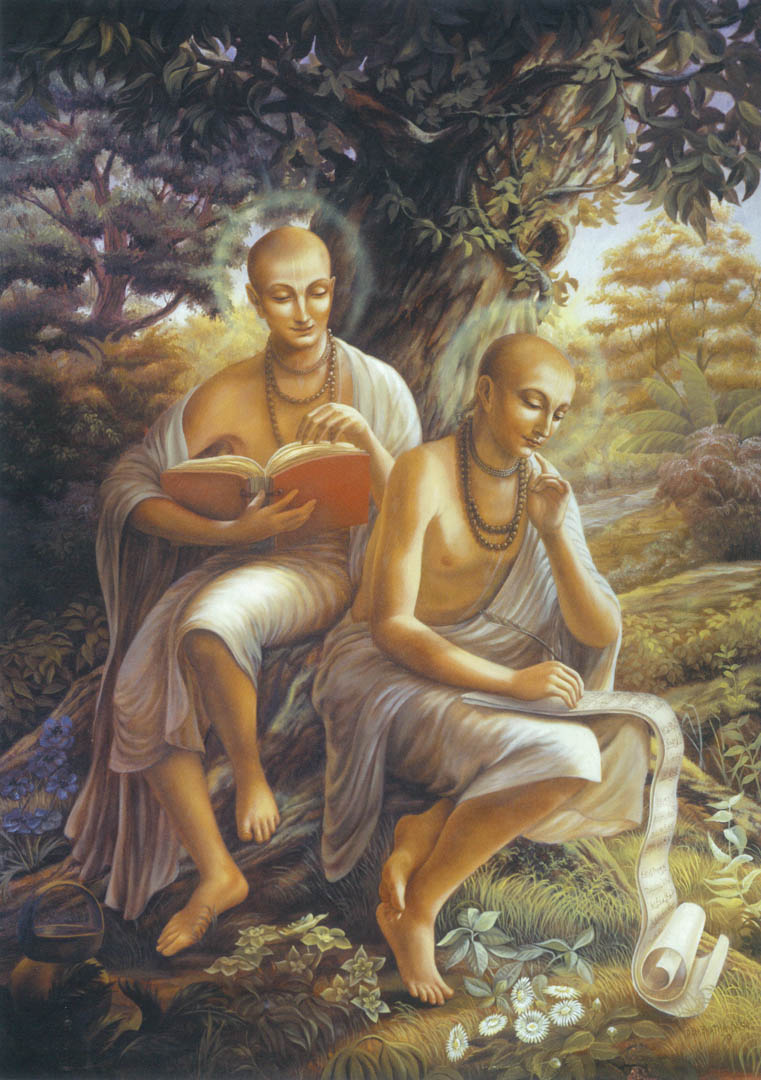 Gosvāmī, and other Vaiṣṇavas in the disciple order, like Kṛṣṇadāsa Kavirāja Gosvāmī, Narottama Ṭhākura, Śrīnivāsa Ācārya, Śyāmānanda Prabhu, Viśvanātha Cakravartī Ṭhākura, Bhaktivinoda Ṭhākura, Śrīla Gaurakiśora dāsa Bābājī Mahārāja, Śrīla Prabhupāda – they are all kalpa-tarus (wish-fulfilling desire trees) that can fulfil all your desires. From worldly desires to spiritual desires, from the desire to go to Vaikuṇṭha, even to Goloka Vṛndāvana. So try not to have worldly desires. Otherwise, they will be fulfilled and bhakti will go away.
Gosvāmī, and other Vaiṣṇavas in the disciple order, like Kṛṣṇadāsa Kavirāja Gosvāmī, Narottama Ṭhākura, Śrīnivāsa Ācārya, Śyāmānanda Prabhu, Viśvanātha Cakravartī Ṭhākura, Bhaktivinoda Ṭhākura, Śrīla Gaurakiśora dāsa Bābājī Mahārāja, Śrīla Prabhupāda – they are all kalpa-tarus (wish-fulfilling desire trees) that can fulfil all your desires. From worldly desires to spiritual desires, from the desire to go to Vaikuṇṭha, even to Goloka Vṛndāvana. So try not to have worldly desires. Otherwise, they will be fulfilled and bhakti will go away.
One who is in this world, having much wealth and so many objects of sense enjoyment – everything – is still not happy. Do you know Rāvaṇa? Everything in his kingdom was made of gold. All the homes and everything in Laṅkā were made of gold and jewels. Rāvaṇa had a vimāna, an aeroplane that he had taken from Kuvera, on which he could go anywhere, just like the mind can go anywhere, without the need of even a driver and the fear of an accident. In the vimāna he could seat two people, one person, or lakhs and lakhs of people. All the facilities were there to enjoy. He could have anything he liked to eat, drink, or enjoy. But he was not satisfied. He wanted to construct a stairway to heaven so that anyone, without doing any yajña or practice, could climb up to heaven and take 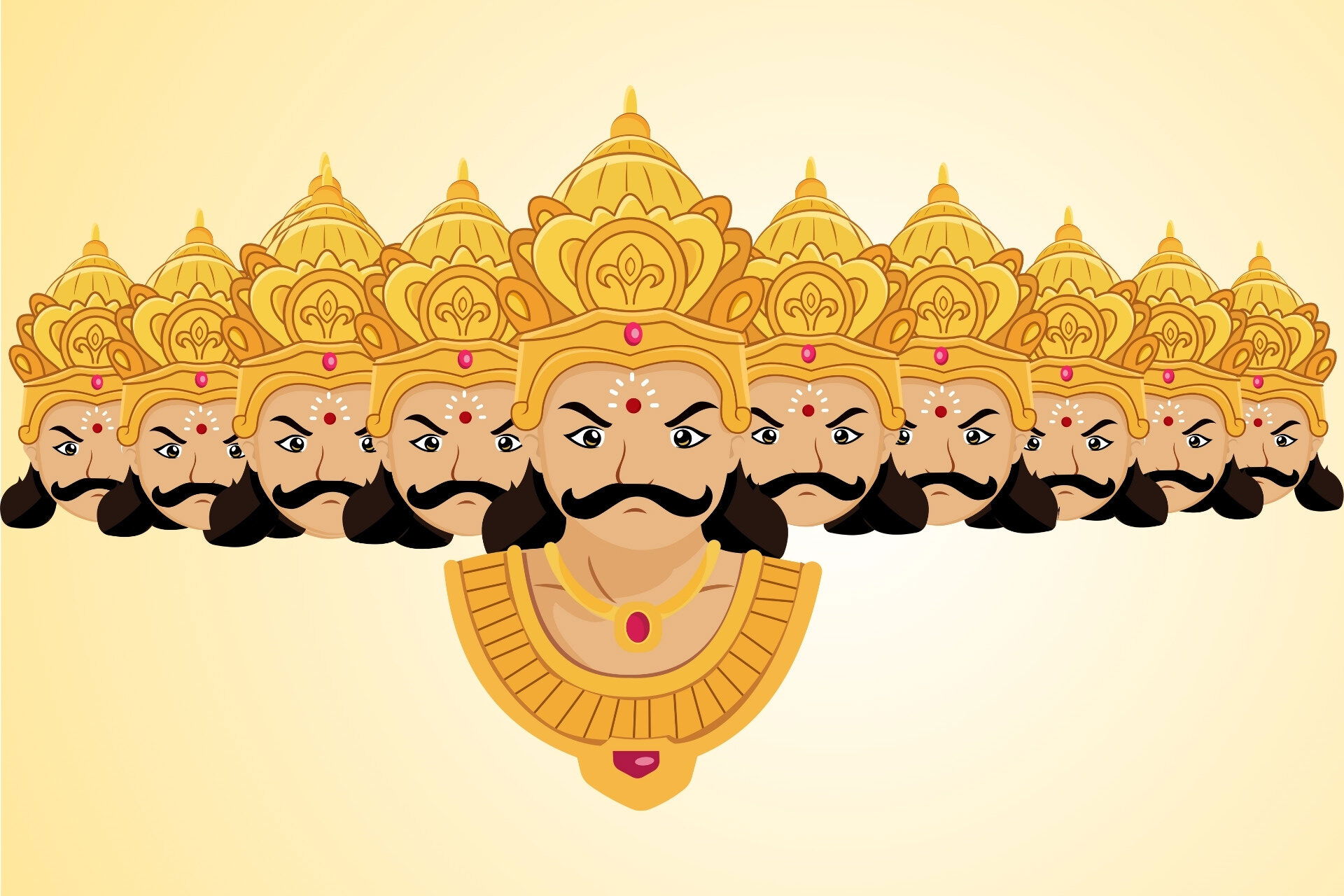 amṛta, nectar by which one would never die.
amṛta, nectar by which one would never die.
However, Rāvaṇa could not fulfil his desire. He was killed by Rāmacandra. Not only him but his whole dynasty – his sons, grandsons, and everyone. And the golden Laṅkā was destroyed in a moment.
Rāvaṇa was unsatisfied, and his desires were not fulfilled despite all his efforts to accumulate objects of enjoyment. No one can be satisfied in this world. Svāmījī has written and told about this extensively. Thus, our ācāryas, like Rūpa Gosvāmī and Caitanya Mahāprabhu Himself, left everything. They only begged a few capātīs to maintain their lives.
If you want to do kṛṣṇa-bhajana, try to follow in the footsteps of Rūpa-Sanātana. Thus, we chant: vāñchā-kalpa-tarubhyaś ca – the Vaiṣṇavas can bestow everything. We pray:
vāñchā-kalpa-tarubhyaś ca
kṛpā-sindhubhya eva ca
patitānāṁ pāvanebhyo
vaiṣṇavebhyo namo namaḥ
Vaiṣṇavas are oceans of mercy. More than this! Their mercy is boundless and depthless. Even if you don’t desire their mercy, their greatest mercy, they will still bestow it upon you. They will bestow their greatest mercy upon you. If you want anything from the Vaiṣṇava to satisfy your senses, they will say, “Come with me, chant harināma!” And they will give kṛṣṇa-prema. They will not give all these other things.
For example, Bilvamaṅgala Ṭhākura was attached to a beautiful prostitute. She sang so sweetly. Bilvamaṅgala was so attracted that he gave up his wife and children. But Kṛṣṇa wanted him, so she rejected him. Kṛṣṇa came in due course and took him. How did He take him? When Bilvamaṅgala was going to Vṛndāvana, he thought, “I will never return home.” He was weeping and thinking like that, going forward on the path to Vṛndāvana.
On his way, he saw a well. There was a young kiśorī girl there, taking water. In previous days, everyone in India would draw water from wells. The ladies would carry three, four, or five pots and collect water from the village well for their homes. They were very strong. Many girls were taking water from the well. At the well, Bilvamaṅgala saw a beautiful kiśorī girl who had recently married. As he approached the vicinity of the well, he felt thirsty. Actually, he was not thirsty, but he was thirsty. You know that thirst. He went to the girl and said, “I am so thirsty!” He wanted to see that girl’s beauty. She was carrying four or five pots of water.
She returned home, and Bilvamaṅgala followed her at a distance. Bilvamaṅgala approached the house and went to her husband sitting under a tree. She had already gone inside the house, and Bilvamaṅgala was standing near it.
Her husband said, “Perhaps you are a sādhu. Do you want anything? Would you like a capātī? Would you like some flour to cook for yourself? Would you like me to bring you anything?”
Bilvamaṅgala said, “I want to see that lady who just entered the house.”
“She is my wife. Do you want to meet her?”
“Yes.”
The husband went into his house and told his wife, “Come out, the sādhu wants to speak with you. Perhaps he desires something that you can help with. You can give him a capātī or as he likes.”
The custom in India was to give the sādhu as he desired. The husband was very simple and innocent. He had no idea anyone could be attracted to his wife like that.
When the lady exited the house, Bilvamaṅgala asked her, “Please bring me two of your hairpins.”
She could not understand why he wanted them, but she immediately went into her room and brought two hairpins to Bilvamaṅgala. Bilvamaṅgala thought, “I left that prostitute that I loved so much, but now again, my eyes are deceiving me. So if there are no eyes, then I won’t be able to be attracted by the external objects of this world. These eyes are the main root of coming and going to this world.”
Thus thinking, Bilvamaṅgala plucked out his eyes with the hairpins. Blood flowed profusely from his eye sockets. But he was not unhappy, he was very happy. The husband and wife became so worried they began to cry out, but Bilvamaṅgala chanted:
hare kṛṣṇa hare kṛṣṇa kṛṣṇa kṛṣṇa hare hare
hare rāma hare rāma rāma rāma hare hare
In this way, Bilvamaṅgala continued to walk on the pathway towards Vṛndāvana. Soon after, Kṛṣṇa appeared as a very attractive, sweet boy of eleven years. He spoke affectionately with Bilvamaṅgala, saying, “Oh Mahātmā, where are you going?”
“I am going to Vṛndāvana.”
“I am also going to Vṛndāvana,” Kṛṣṇa said. “If you want, you can come with Me because you are blind. You can catch hold of My stick and follow Me to Vṛndāvana.”
Bilvamaṅgala became so joyful. While singing prayers to Kṛṣṇa, seeing Kṛṣṇa everywhere, playing with the 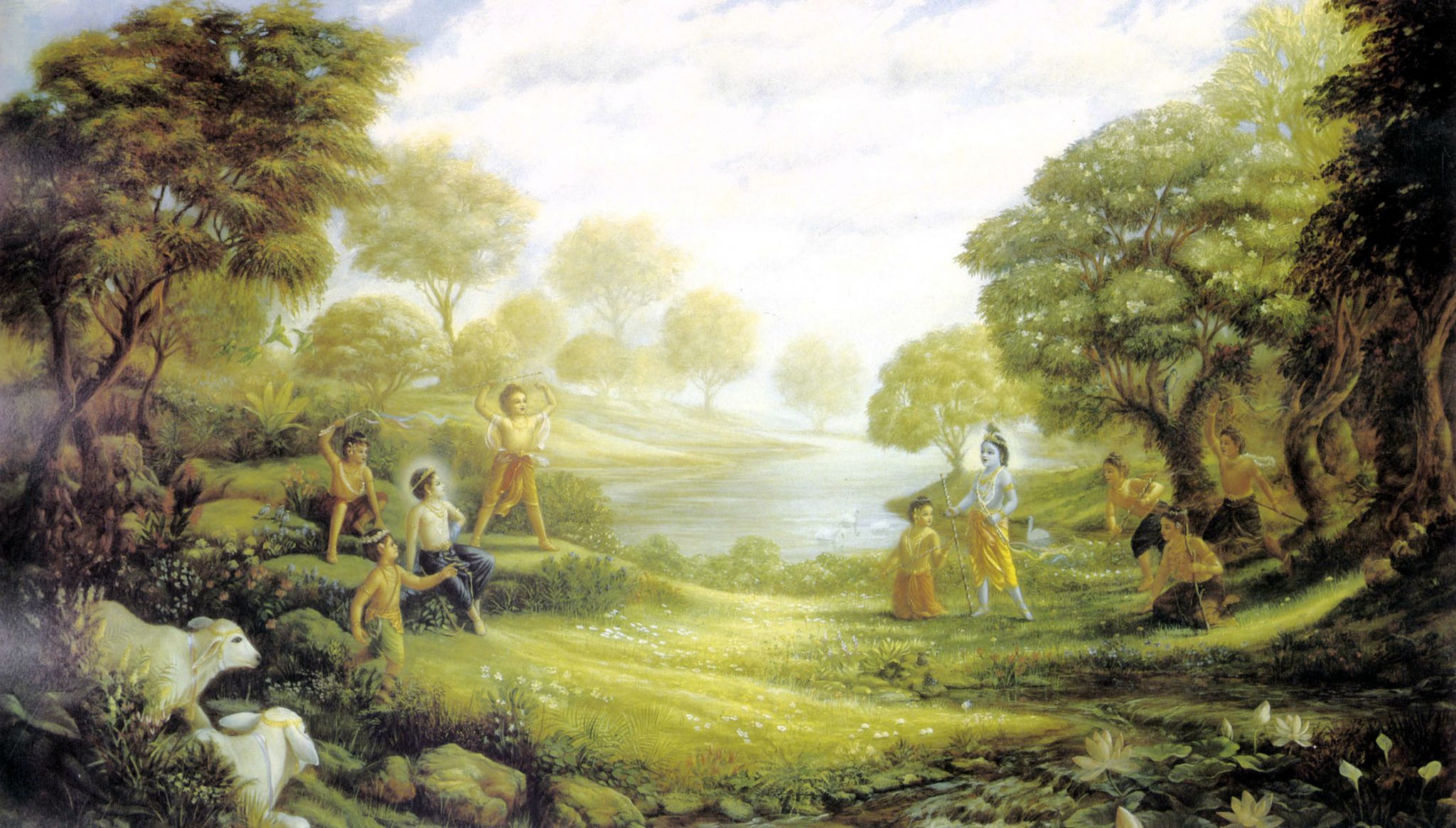 gopīs, playing with Rādhā, going to graze the cows in the forest with lakhs and lakhs of calves and cowherd boys like Śrīdāmā, Sudāmā, Vasudāmā, Stoka-kṛṣṇa, Arjuna, Ujjvala, Bhadra, Subala, Madhumaṅgala – so many cowherd boys.
gopīs, playing with Rādhā, going to graze the cows in the forest with lakhs and lakhs of calves and cowherd boys like Śrīdāmā, Sudāmā, Vasudāmā, Stoka-kṛṣṇa, Arjuna, Ujjvala, Bhadra, Subala, Madhumaṅgala – so many cowherd boys.
Bilvamaṅgala saw Kṛṣṇa performing so many sweet pastimes, and he began to weep and pray. He wrote so many prayers, over a hundred ślokas. They are called Kṛṣṇa-karṇāmṛta.
Kṛṣṇa-karṇāmṛta means nectar for the ears of Kṛṣṇa. Wherever these songs are being sung, Kṛṣṇa will come and stand there to hear. Devotees like this have performed vandana to Kṛṣṇa, and Kṛṣṇa is satisfied by these prayers.
Vaiṣṇava poets have performed prayers like this. You should try to learn these things. You don’t know Sanskrit or Hindi, but you can chant, as Svāmījī taught you:
śrī-kṛṣṇa-caitanya prabhu-nityānanda
śrī-advaita gadādhara śrīvāsādi-gaura-bhakta-vṛnda
hare kṛṣṇa hare kṛṣṇa kṛṣṇa kṛṣṇa hare hare
hare rāma hare rāma rāma rāma hare hare
He also taught you (Śrīla Bhaktivedānta Nārāyaṇa Mahārāja sings):
(jaya) rādhā-mādhava (jaya) kuñja-bihārī
(jaya) gopī-jana-vallabha (jaya) giri-vara-dhārī
(jaya) yaśodā-nandana (jaya) vraja-jana-rañjana
(jaya) yāmuna-tīra-vanacārī
If you sing this kīrtana as Svāmījī has taught you, Kṛṣṇa and Rādhikā, with all Their associates, will come and hear. There is no doubt at all. Thus, you should sing these kīrtanas.
Some know Hindi, Sanskrit, Bengali, and other languages, but you can still sing all these kīrtanas.
[Śrī] Nanda-nandanāṣṭakam is such a sweet kīrtana. In the month of Kārtika, we sing this every day with four or five hundred people singing together. It is so lovely. I think that Kṛṣṇa and Rādhikā will surely come. If anyone chants the name of Kṛṣṇa, Śrīmatī Rādhikā is satisfied, and if you chant rādhā-nāma, Kṛṣṇa is satisfied. So we chant the Hare Kṛṣṇa mahā-mantra, and please both Kṛṣṇa and Rādhikā. When we chant Hare, Kṛṣṇa comes, and when we chant Kṛṣṇa, Rādhikā comes. This is the method of chanting. Try to chant from the heart.
sucāru-vaktra-maṇḍalaṁ sukarṇa-ratna-kuṇḍalam
sucarcitāṅga-candanaṁ namāmi nanda-nandanam (1)
[His round face is so lovely, His beautiful ears are adorned with hanging jewelled earrings, and His body is nicely anointed with fragrant sandalwood paste. I offer praṇāma to that Śrī Nanda-nandana.]
sudīrgha-netra-paṅkajaṁ śikhi-śikhaṇḍa-mūrdhajam
anaṅga-koṭi-mohanaṁ namāmi nanda-nandanam (2)
[His eyes are elongated like lotuses; peacock feathers adorn His head; and He enchants millions of Cupids. I offer praṇāma to that Śrī Nanda-nandana.]
sunāsikāgra-mauktikaṁ svacchanda-danta-paṅktikam
navāmbudāṅga-cikkaṇaṁ namāmi nanda-nandanam (3)
[From the tip of His beautiful nose hangs an elephant pearl, His rows of teeth shine naturally [like pearls], and His bodily complexion shines like a fresh raincloud. I offer praṇāma to that Śrī Nanda-nandana.]
kareṇa veṇu-rañjitaṁ gati-karīndra-gañjitam
dukūla-pīta-śobhanaṁ namāmi nanda-nandanam (4)
[His hands are adorned with a flute, His majestic gait excels that of the king of elephants, and fine yellow garments beautify Him. I offer praṇāma to that Śrī Nanda-nandana.]
tri-bhaṅga-deha-sundaraṁ nakha-dyuti-sudhākaram
amūlya-ratna-bhūṣaṇaṁ namāmi nanda-nandanam (5)
[His threefold bending form is most beautiful, His nails glow like the moon, and priceless gems adorn Him. I offer praṇāma to that Śrī Nanda-nandana.]
sugandha-aṅga-saurabham uro-virāji-kaustubham
sphurac-chrīvatsa-lāñchanaṁ namāmi nanda-nandanam (6)
[His body exudes an extraordinarily enchanting fragrance, and upon His broad chest, the Kaustubha gem shines, along with the mark of Śrīvatsa. I offer praṇāma to that Śrī Nanda-nandana.]
vṛndāvana-sunāgaraṁ vilāsānuga-vāsasam
surendra-garva-mocanaṁ namāmi nanda-nandanam (7)
[He is Vṛndāvana’s expert paramour who dresses to enhance His charming, playful pastimes and liberates Indra from his pride. I offer praṇāma to that Śrī Nanda-nandana.]
vrajāṅganā-sunāyakaṁ sadā sukha-pradāyakam
jagan-manaḥ pralobhanaṁ namāmi nanda-nandanam (8)
[The exquisite lover of the damsels of Vraja always bestows happiness upon all living entities and enchants their minds. I offer praṇāma to that Śrī Nanda-nandana.]
śrī-nanda-nandanāṣṭakaṁ paṭhed yaḥ śraddhayānvitaḥ
tared bhavābdhiṁ dustaraṁ labhet tad-aṅghri-yugmakam (9)
[Whoever with faith recites these eight verses glorifying the son of Nanda will easily conquer the insurmountable ocean of material existence and attain shelter at His two lotus feet.]
Sucāru-vaktra-maṇḍalaṁ sukarṇa-ratna-kuṇḍalam – Kṛṣṇa is so beautiful! To whom are we dedicating ourselves? Our Guru has given us the mantra, gopī-jana-vallabhāya. This is the gopāla-mantra. This is a most important mantra. Svāmījī has given this mantra to those who have received the second initiation.
Kṛṣṇa is so beautiful! Sucāru-vaktra-maṇḍalaṁ sukarṇa-ratna-kuṇḍalam – He has such a beautiful face. Kuṇḍalas means His earrings. They are so beautiful, so beautiful. If Kṛṣṇa does not wear earrings, He is more beautiful! And if He wears earrings, He is more beautiful! The earrings are so beautiful, but they cannot give more beauty to Kṛṣṇa because He is the most beautiful. But when Mother Yaśodā gives Kṛṣṇa the kuṇḍalas (earrings) they become so beautiful on His ears.
The Vaiṣṇavas pray to those earrings. Especially the gopīs. They think, “We cannot kiss Kṛṣṇa, but the earrings are day and night kissing Kṛṣṇa: especially when He runs, the earrings swing on His cheeks and constantly kiss Him. So how fortunate those earrings are!”
Sukarṇa-ratna-kuṇḍalam – the ornaments of Kṛṣṇa are all transcendental. Baladeva Prabhu has manifested as all 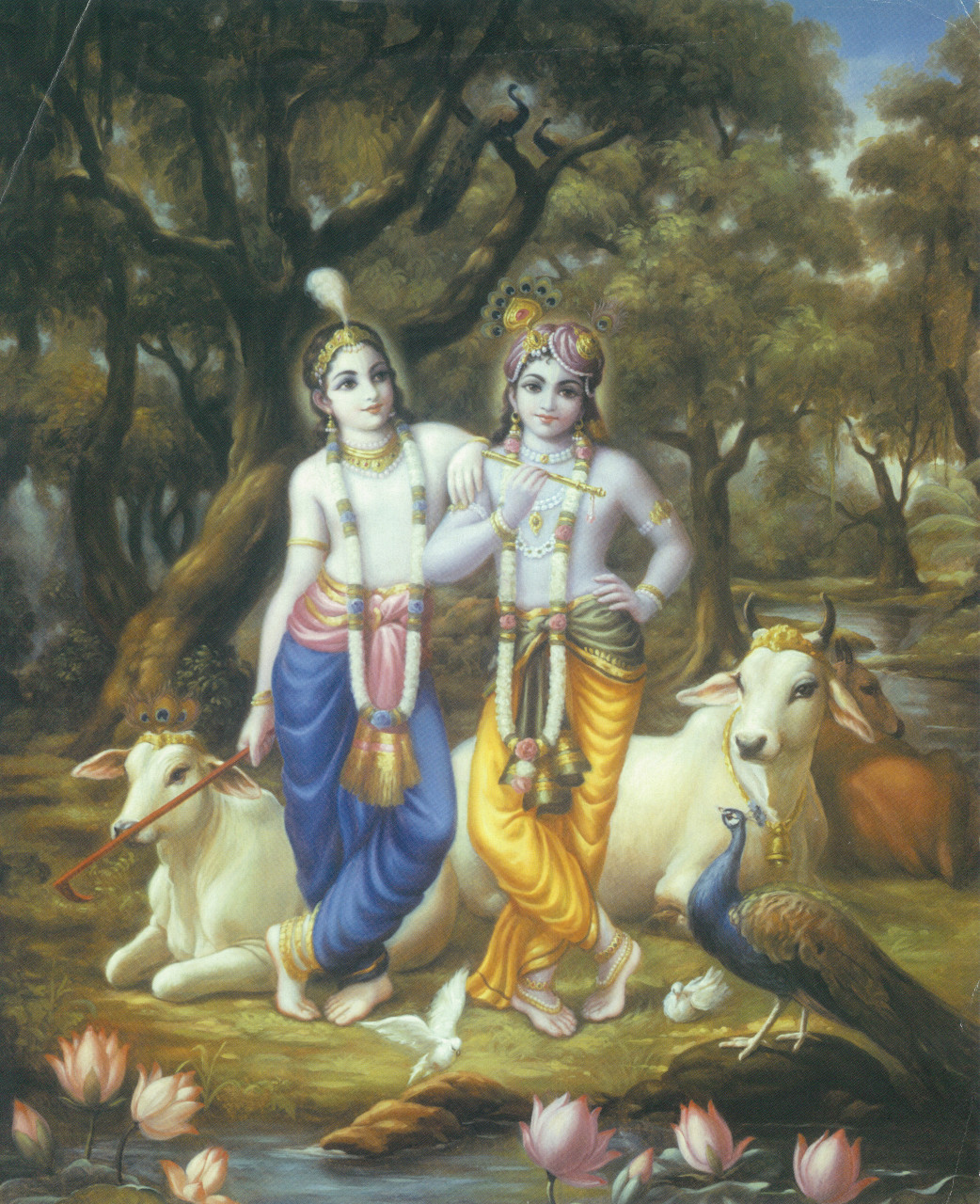 the ornaments. He is always serving Kṛṣṇa in all ways. Kṛṣṇa’s flute is Baladeva, His ornaments are Baladeva, His stick is Baladeva. All Kṛṣṇa’s paraphernalia is the manifestation of Baladeva Prabhu, and He is serving in so many ways. Baladeva is the topmost dāsa of Kṛṣṇa. But here, there is no proper word for that word, dāsa. When we say “Servant,” it seems like something much lower. But in Goloka Vṛndāvana, it is not like that. They are equal to Kṛṣṇa. Baladeva Prabhu serves as a bosom friend, more than a friend. For example, Yaśodā Mā is an elder of Kṛṣṇa [a gopī]. When Baladeva wants to serve Kṛṣṇa like the gopīs, He then becomes Anaṅga Mañjarī. He can serve in any shape, and all His forms are eternal, not momentary.
the ornaments. He is always serving Kṛṣṇa in all ways. Kṛṣṇa’s flute is Baladeva, His ornaments are Baladeva, His stick is Baladeva. All Kṛṣṇa’s paraphernalia is the manifestation of Baladeva Prabhu, and He is serving in so many ways. Baladeva is the topmost dāsa of Kṛṣṇa. But here, there is no proper word for that word, dāsa. When we say “Servant,” it seems like something much lower. But in Goloka Vṛndāvana, it is not like that. They are equal to Kṛṣṇa. Baladeva Prabhu serves as a bosom friend, more than a friend. For example, Yaśodā Mā is an elder of Kṛṣṇa [a gopī]. When Baladeva wants to serve Kṛṣṇa like the gopīs, He then becomes Anaṅga Mañjarī. He can serve in any shape, and all His forms are eternal, not momentary.
Kṛṣṇa is so beautiful. And when He manifests His tribhaṅga-lalita (charming threefold bending) form, He is so beautiful! Yaśodā Mā or Śrīmatī Rādhikā have decorated Kṛṣṇa with candana. What candana? Malaya-candana. The Malaya Giri mountains are in India. There are thousands of candana (sandalwood) trees there. Real sandalwood cannot be easily collected. There are so many poisonous serpents that stay next to the candana trees, and they are cooled by their potency. Near the candana trees are other trees that imbibe the fragrance of the candana by their proximity. Getting real malaya-candana is very difficult and expensive.
So, Yaśodā Mātā uses sandal [paste], kuṅkuma and saffron to decorate Kṛṣṇa. It is so fragrant! If a little drop of that goes anywhere, it is so cooling. Yaśodā Mā gave that candana to Kṛṣṇa. I bow down to that Kṛṣṇa. I bow down to that Kṛṣṇa whose eyes are like lotus petals. He is so beautiful! He is so dear to the gopas and gopīs. He worships the gopīs with His eyes. He locks His eyes with the eyes of the gopīs and becomes controlled by them.
Śikhi-śikhaṇḍa-mūrdhajam – He is decorated with a peacock feather.
Anaṅga-koṭi-mohanaṁ – He attracts millions and millions of cupids (anaṅga-devas). I bow down to that Nanda-nandana. He should appear in my heart.
Sunāsikāgra-mauktikaṁ svacchanda-danta-paṅktikam – His nose is so beautiful! A gaja-mukti, or elephant pearl, decorates His nose. His teeth are decorated with red pāna and appear like pomegranate seeds. He is more beautiful than a fresh raincloud. I bow down to that Nanda-nandana.
Kareṇa veṇu-rañjitaṁ gati-karīndra-gañjitam dukūla-pīta-śobhanaṁ namāmi nanda-nandanam – He is playing on the flute with His attractive fingers. He is decorated with a yellow shawl (pītāmbara).
Vṛndāvana-sunāgaraṁ vilāsānuga-vāsasam – He is the Sunāgara (Kāmadeva) of Vṛndāvana.
Surendra-garva-mocanaṁ namāmi nanda-nandanam – He defeated Indra. By defeating Indra, He took the pārijāta tree from heaven and gave it to Satyabhāmā.
Vrajāṅganā-sunāyakaṁ sadā sukha-pradāyakam – I have explained this, and it has been translated.
We should sing some prayers like this. You can do it alone or with one, two, three, four, or more. You should also sing Rādhikāṣṭakam. We also daily sing:
(hari) haraye namaḥ kṛṣṇa yādavāya namaḥ
Do you remember this? You should remember this. Also:
jaya rādhe, jaya kṛṣṇa, jaya vṛndāvana
These are the prayers of Gauḍīya Vaiṣṇavas. In this way, try to develop your Kṛṣṇa consciousness. Don’t take eggs, don’t take meat, and so forth. Try not to make offences to any Vaiṣṇava; give honour to all.
I will read some important verses of Śrīla Bhaktisiddhānta Sarasvatī Gosvāmī Prabhupāda.
You should know that Kṛṣṇa is the only bhokta, the only enjoyer, and we are all meant to be enjoyed by Him.  All kinds of sins and worldly desires will easily disappear if we have this mentality. We want these things to disappear, but something remains in us. And this will remain up to bhāvāvasthā. At the stage of bhāva, these will completely disappear. We should not drink water for ourselves. We should not take anything for ourselves. Don’t eat to fill the stomach. Don’t sleep for yourself; sleep for Kṛṣṇa. Drink water for Kṛṣṇa. Take mahā-prasādam to please Kṛṣṇa and to serve Kṛṣṇa. Do everything for Kṛṣṇa. Perhaps you know this thing. If you don’t sleep the next day, you cannot serve Kṛṣṇa. So you should sleep a little, as required. Don’t sleep more because it will be ajñāna, in the mode of ignorance. Take mahā-prasādam (the remnants of Kṛṣṇa). After the Vaiṣṇavas have taken this mahā-prasādam, the remnants are elevated to mahā-mahā-prasādam.
All kinds of sins and worldly desires will easily disappear if we have this mentality. We want these things to disappear, but something remains in us. And this will remain up to bhāvāvasthā. At the stage of bhāva, these will completely disappear. We should not drink water for ourselves. We should not take anything for ourselves. Don’t eat to fill the stomach. Don’t sleep for yourself; sleep for Kṛṣṇa. Drink water for Kṛṣṇa. Take mahā-prasādam to please Kṛṣṇa and to serve Kṛṣṇa. Do everything for Kṛṣṇa. Perhaps you know this thing. If you don’t sleep the next day, you cannot serve Kṛṣṇa. So you should sleep a little, as required. Don’t sleep more because it will be ajñāna, in the mode of ignorance. Take mahā-prasādam (the remnants of Kṛṣṇa). After the Vaiṣṇavas have taken this mahā-prasādam, the remnants are elevated to mahā-mahā-prasādam.
Take mahā-prasādam while chanting the mantra:
mahā-prasāde govinde
nāma-brahmaṇi vaiṣṇave
svalpa-puṇyavatāṁ rājan
viśvāso naiva jāyate
Skanda Purāṇa
[“Persons who are not very highly elevated in pious activities cannot believe in the remnants of food (prasādam) of the Supreme Personality of Godhead, nor in Govinda, the holy name of the Lord, nor in the Vaiṣṇavas.”]
We serve mahā-prasādam; [we] do not take. Don’t take to enjoy yourself. But take to serve. Just as we serve the holy name by chanting, similarly, we should serve mahā-prasādam and caraṇāmṛta. Everything is there to be served. Kṛṣṇa is the only bhokta, enjoyer, and we are all to be enjoyed – everything.
Those who don’t perform bhajana of Kṛṣṇa are the most foolish and are killers of the self. Whether they know or don’t know. We should perform kṛṣṇa-bhajana.
To chant harināma, to remember harināma, is equal to taking darśana of Kṛṣṇa. Both are the same. Kṛṣṇa’s name is the sādhana, and when sādhana is matured, we will see the name as directly Rādhā-Kṛṣṇa conjugal. Thus, to chant or do kīrtana of Kṛṣṇa’s names is equal to taking the darśana of Kṛṣṇa. There is no difference. So chant the holy names like this. When we chant, we should remember that Kṛṣṇa’s names and Kṛṣṇa are not different. May I tell a story?
You know the name of Hanumān. Once, there was a person whose duty was to churn seeds to extract oil. He had an ox and would churn the seeds for oil the whole day with this ox. The whole day he would tell the ox, “Go on, go on, go on!” Day and night he was absorbed in this.
One day, Nārada met him and said, “You are engaged in this way, all the time chanting, “Go on, go on, go on. Why don’t you chant Rāma or Kṛṣṇa’s name instead?”
The man replied, “I have no time at all! I cannot chant.”
“You have so much time!”
“No! I have no time.”
“Okay,” Nārada said, “What do you do while going to the bathroom?”
“Nothing.”
“Okay, at that time you can chant. At that time you can chant.”
“I should not chant when I am not pure. At that time, one is not pure.”
“No, you can chant at that time.”
So one day, the farmer went to the field to relieve himself, and at that time, he was chanting, “Rāma, Rāma, Rāma.” At once, Hanumān appeared there. If anyone chants Rāma’s name, Hanumān will immediately appear there and pray to him. When Hanumān appeared there and saw that the man was chanting, ‘Rāma, Rāma, Rāma’ while passing stool, Hanumān became angry and kicked him very hard. Previously, Hanumān once kicked Rāvaṇa, and he fell flat. He kicked Kumbhakarṇa and he fell flat and ate dirt. But that person who was very weak, was kicked by Hanumān, and yet he continued chanting, “Rāma, Rāma,” as if nothing had happened.
Hanumān thought, ‘Why has nothing happened? Why didn’t he fall on the earth?”
Later, Hanumān went to Rāma’s palace and heard that Rāma was in pain, moaning, “Ah!” “Ah!” [He was] in great agony.
Hanumān went to Rāma and said, “What happened, Prabhu? Why are You moaning?”
“You should not come to Me and ask such a question,” Rāma replied. “You kicked Me so hard! Now I am 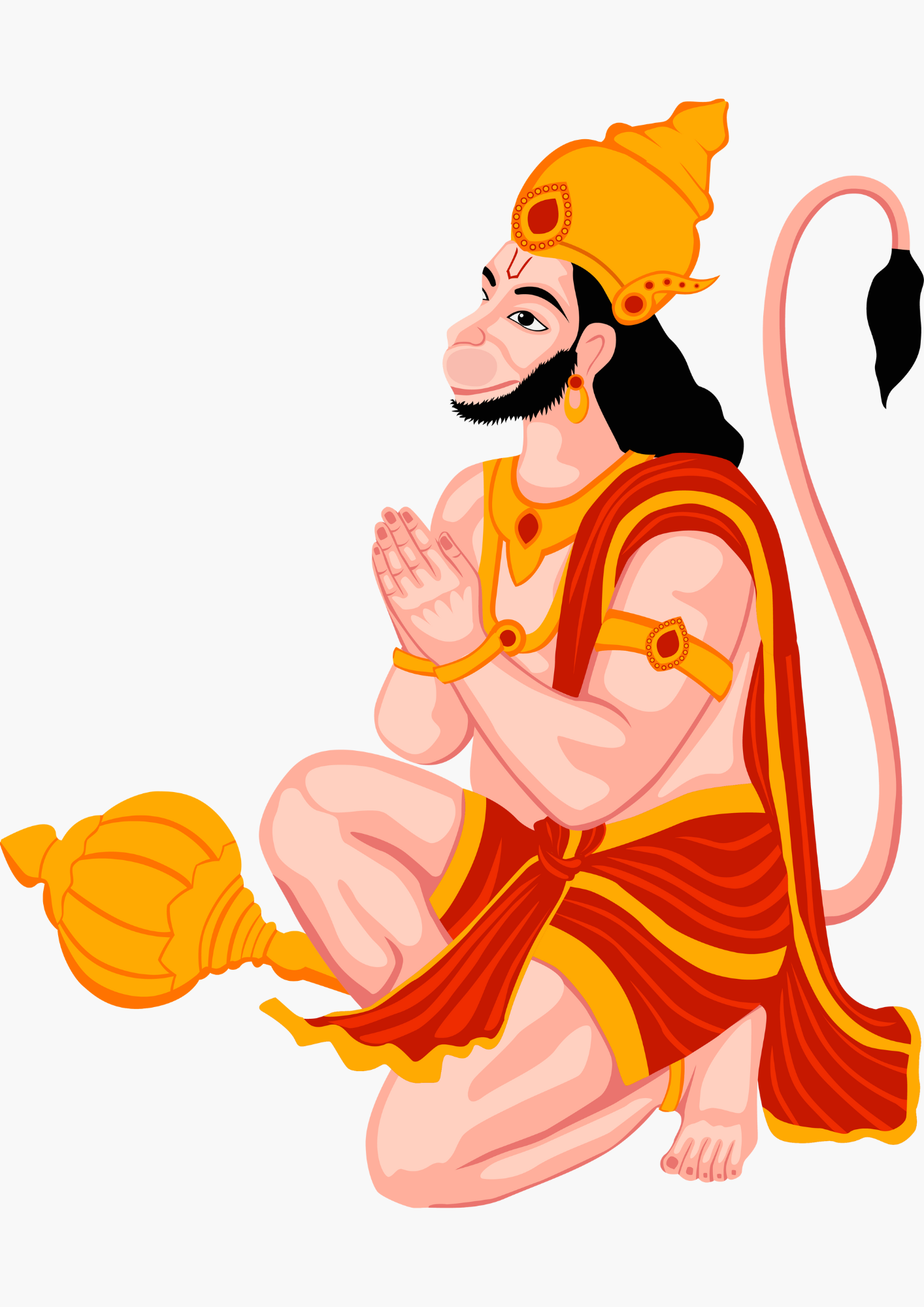 feeling so much pain!”
feeling so much pain!”
“I never kicked You!” Hanumān declared in shock.
“No! You kicked Me!”
“How did I kick You?” Hanumān asked.
“When that person was chanting, ‘Rāma, Rāma,’ in an impure condition, you kicked him for that. But nāma and nāmī are equal, the same thing. So when you kicked him while he was chanting, ‘Rāma, Rāma,’ that kick came on to My back!”
Hanumān was astonished and prayed to the Lord, saying, “From today, I will never do like this!”
Once, Caitanya Mahāprabhu was in Purī. Gopāla-guru, who was a young boy at that time, around sixteen years old, used to serve Mahāprabhu day and night with Govinda Prabhu. One day, Caitanya Mahāprabhu was going to the bathroom. Not the bathroom, an open field, like Indians do. Now, they don’t do that. We did it in our boyhood. Caitanya Mahāprabhu took water and went towards the bathroom. As He was going, He stuck out His tongue and grabbed it with His fingers.
Gopāla-guru asked Mahāprabhu, “Why are You holding Your tongue so strongly?”
“Because when I go to the bathroom My tongue will keep uttering, ‘hare kṛṣṇa hare kṛṣṇa kṛṣṇa kṛṣṇa hare hare, hare rāma hare rāma rāma rāma hare hare. I want to stop My tongue from chanting at that time because I am not pure. But it will not stop of its own accord, so I hold it.”
Gopāla-guru offered praṇāma to Caitanya Mahāprabhu and said, ”You are holding Your tongue now, but if anyone is dying while going to the bathroom, what should they do at that time? Should they not chant at that time?”
Do you understand what I am saying? We can chant harināma at any time while going, coming, laughing, or taking prasādam — at any time, you can chant harināma. Even while going to the bathroom!
There are no rules and regulations regarding time, place, and circumstance for chanting harināma. Kṛṣṇa is there! Kṛṣṇa is that nāma.
Caitanya Mahāprabhu was so pleased with that boy and said, “Now you have become a guru! Now all will call you, ‘Gopāla-guru,’ not just Gopāla.”
This Gopāla became our sampradāya-guru. He was the disciple of Vakreśvara Paṇḍita. So we should know that when we chant the holy names, Rādhā and Kṛṣṇa conjugal are both present.
While performing bhakti, we should first adopt śaraṇāgati – surrendering. There are six kinds of śaraṇāgati. Surrender itself is not bhakti, but it is the door to enter kṛṣṇa-bhakti. We should first follow śaraṇāgati. Otherwise, we cannot enter bhakti. First, we must vow to adopt only what is favourable for bhakti. If it is not favourable, we should not perform it. What is not favourable for bhakti should be given up. Tāmasika and rājasika things have been described in the Gītā. There are daivika pravṛttis and āsurika pravṛttis. We should not adopt tāmasika or rājasika activities. Try to adopt only sāttvika things and change them to nirguṇa, kṛṣṇa-bhakti. [We must] vow to adopt things favourable for bhakti, like vaiṣṇava-sevā.
“I will not live without Vṛndāvana-dhāma, Gaura-dhāma.” If we cannot reside there directly, then we can be there by mind, seeing, “This is Vṛndāvana.” There are so many devotees, like gopas and gopīs. Cows are here. This is a country for cows, like Vṛndāvana. Go, Gokula. Here, you are seeing Rūpa Mañjarī and all. Śrī Caitanya Mahāprabhu is here. We sing the songs of Vṛndāvana, like namāmi nanda-nandanam and hare kṛṣṇa.
Caitanya Mahāprabhu saw Vṛndāvana and everything of Vṛndāvana in Jagannātha Purī. Rūpa Gosvāmī saw Vṛndāvana and Rādhā-kuṇḍa in the place where previously he was the prime minister of Hussain Shah, a Mughal king. In Māyāpura, Prabhupāda Sarasvatī Ṭhākura lived on the bank of Rādhā-kuṇḍa and Śyāma-kuṇḍa. In Godrumadvīpa, Bhaktivinoda Ṭhākura lived in Svānanda-sukhada-kuñja. What is Svānanda-sukhada-kuñja? It is in Rādhā-kuṇḍa. He used to reside there, thinking, “I am in Vṛndāvana, in the middle of Rādhā-kuṇḍa, where Lalitā, Viśākhā, and all are serving Rādhā-Kṛṣṇa.”
So we should think that we are in Vṛndāvana by mind. And when we get the opportunity, we can go there 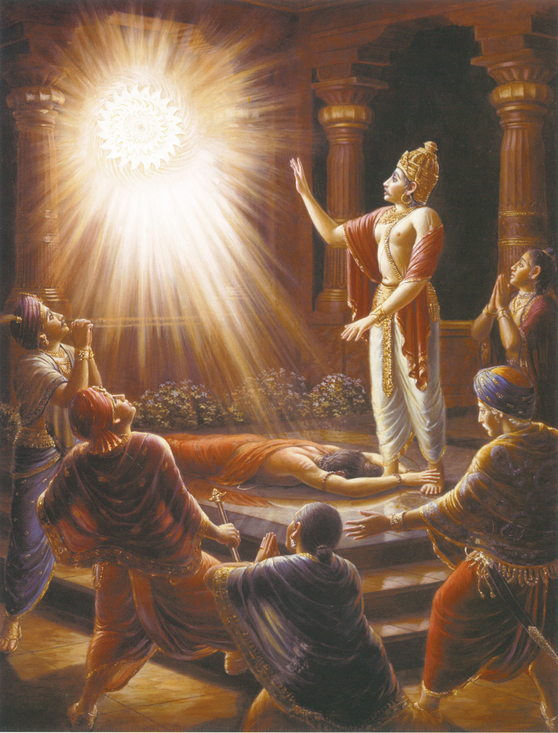 directly and see Girirāja Govardhana, Yamunā, Rādhā-kuṇḍa, Śyāma-kuṇḍa, Vaṁśīvaṭa, Sevā-kuñja, Nidhuvana – all the pastime places of Rādhā-Kṛṣṇa. Try to do like this. Then Kṛṣṇa will certainly protect us. No one in this world can save us or protect us. Only Kṛṣṇa can do this. Śrīmatī Rādhikā can do this. So we should take shelter of Kṛṣṇa. If anyone has taken shelter of Kṛṣṇa, he will not fear anything in this world. But we have not taken shelter of the lotus feet of Kṛṣṇa. That is why we fear. Devotees should not fear. Like Prahlāda Mahārāja. Kṛṣṇa always protects the devotees as He protected Prahlāda in the form of Nṛsiṁhadeva. Like Ambarīṣa Mahārāja. Durvāsā tried to kill Ambarīṣa. But Ambarīṣa had no fear because he was a pure devotee. Durvāsā was a brahma-jñānī, but he was afraid of the Sudarśana cakra and ran here and there, calling out, “Save me, save me!”
directly and see Girirāja Govardhana, Yamunā, Rādhā-kuṇḍa, Śyāma-kuṇḍa, Vaṁśīvaṭa, Sevā-kuñja, Nidhuvana – all the pastime places of Rādhā-Kṛṣṇa. Try to do like this. Then Kṛṣṇa will certainly protect us. No one in this world can save us or protect us. Only Kṛṣṇa can do this. Śrīmatī Rādhikā can do this. So we should take shelter of Kṛṣṇa. If anyone has taken shelter of Kṛṣṇa, he will not fear anything in this world. But we have not taken shelter of the lotus feet of Kṛṣṇa. That is why we fear. Devotees should not fear. Like Prahlāda Mahārāja. Kṛṣṇa always protects the devotees as He protected Prahlāda in the form of Nṛsiṁhadeva. Like Ambarīṣa Mahārāja. Durvāsā tried to kill Ambarīṣa. But Ambarīṣa had no fear because he was a pure devotee. Durvāsā was a brahma-jñānī, but he was afraid of the Sudarśana cakra and ran here and there, calling out, “Save me, save me!”
You know about Haridāsa Ṭhākura. The Muslims arrested him and told him, “You should not chant ‘Hare Kṛṣṇa, Hare Kṛṣṇa,’ You should chant, ‘Allah, Khudā!’ because you are a Muslim. Only chant, ‘Allah, Khudā!’”
(Laughter)
They tried to kill him by beating him in twenty-one marketplaces. By being lashed through two or three marketplaces, a person would die. But Haridāsa Ṭhākura was not disturbed. Even though his skin and flesh were all ripped off, and he was practically just bones, still, Haridāsa continued chanting (Śrīla Bhaktivedānta Nārāyaṇa Mahārāja and the devotees chant together):
hare kṛṣṇa hare kṛṣṇa kṛṣṇa kṛṣṇa hare hare
hare rāma hare rāma rāma rāma hare hare
Haridāsa Ṭhākura said, “Even if I am cut into hundreds or thousands of pieces, I will not stop chanting hare kṛṣṇa hare kṛṣṇa kṛṣṇa kṛṣṇa hare hare.”
Can you do this? If you can, then this is niṣṭhā – firm faith. They threw Haridāsa Ṭhākura in the Gaṅgā, but he came out shortly after, fully rejuvenated and chanting, “Hare kṛṣṇa hare kṛṣṇa kṛṣṇa kṛṣṇa hare,” as before.
Thus, Kṛṣṇa will protect us. We have taken shelter of Kṛṣṇa. So we should not be worried about saving ourselves or calling out to others, “Save me, save me, save me!” We have taken shelter of the lotus feet of Kṛṣṇa, so we should not be worried about our clothing, food, and everything. Kṛṣṇa can give everything. He can easily protect us. He told Śrīmatī Rādhikā, “Cook for Rūpa (Rūpa Gosvāmī).” And She cooked for Rūpa and Sanātana. Sanātana Gosvāmī said, “You should not call or disturb Śrīmatī Rādhikā.”
So even Rādhikā and Kṛṣṇa will cook for the devotees. Have faith in this, and bow down to the lotus feet of Kṛṣṇa. Give everything – body, mind, soul – everything you have to Kṛṣṇa, This is called śaraṇāgati. This is the platform for bhakti. This is the door to entering into bhakti. Try to follow this śaraṇāgati. Then we will come to other things: what is śraddhā? What is the seed of bhakti? Bhakti is like a creeper. What is the seed? Śraddhā? Not śraddhā. Śraddhā is the first sprout. The seed is kṛṣṇa-sevā-vāsanā, the desire to serve Kṛṣṇa. The guru gives this. “I will serve Kṛṣṇa!” This vāsanā, or desire, to serve Kṛṣṇa is the seed of bhakti. [It appears] when the guru infuses it into the heart of a devotee or anyone who is even impure. The guru may infuse this kṛṣṇa-sevā-vāsanā into the heart of a person who is full of material desires and who is wretched. And by chanting, hearing and remembering kathā, then kṛṣṇa-sevā-vāsanā, the desire to serve Kṛṣṇa sprouts (manifests externally), and that sprout is śraddhā. We can see śraddhā. We cannot see the vāsanā of [kṛṣṇa-]sevā (desire to serve Kṛṣṇa), but we can infer this by seeing the symptoms. We can see the symptoms of śraddhā. What is śraddhā? What is [kṛṣṇa-]sevā-vāsanā? We will explain this [more] another time.
Sometimes, you can question me if you have any doubts or questions. I will try to answer if I know.
(Laughter)
And if I don’t know, I will say, “I don’t know.” (Śrīla Bhaktivedānta Nārāyaṇa Mahārāja laughs)
If anyone wants to meet me, they can meet me. Gaura-premānande Hari Haribol!
After Holland, we will go to England. I think it will be better to make a plan. You should make a plan with Vrajanātha Prabhu, Madana-mohana, Viśākhā, Raghunātha Bhaṭṭa Prabhu, and others from America and so forth. You should decide and make a very nice program where devotees can come to me, take prasādam, and have somewhere to stay. You should all decide. I don’t know where or how to go, so you should have a meeting so that everything will go smoothly.
Source: Bhakta Bandhav Anthology Volume 1, Discourses delivered by Śrīla Bhaktivedānta Nārāyaṇa Mahārāja
Transcribed and edited by the Bhakta Bandhav Team (Bhakta.org)
Image(s) made possible by Pixabay.com, Krishnapath.org and/or Bhaktiart.net
Unless indicated differently, all verse translations and quotes are from the books by Śrīla Prabhupāda (Vedabase.com)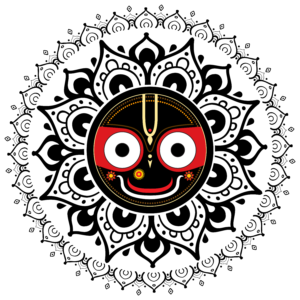
[ad_2]
#Prayer #śaraṇāgati #śraddhā #House #Bhakti







